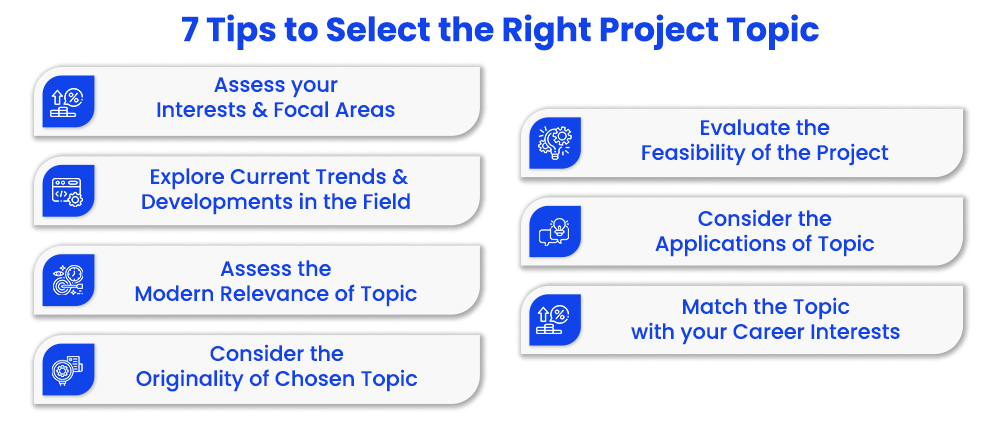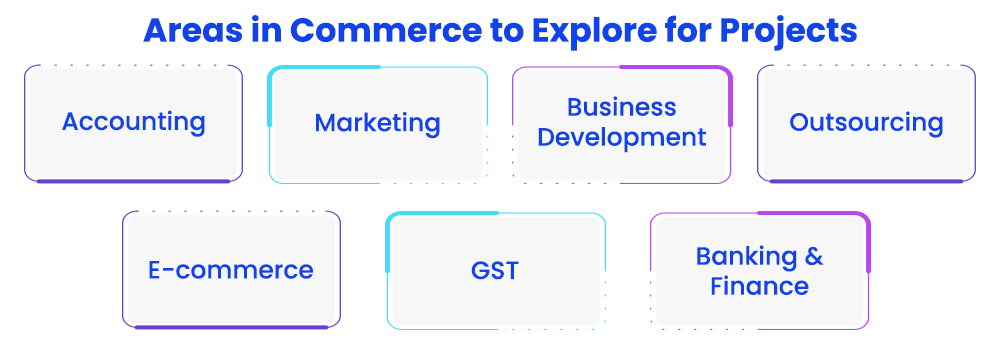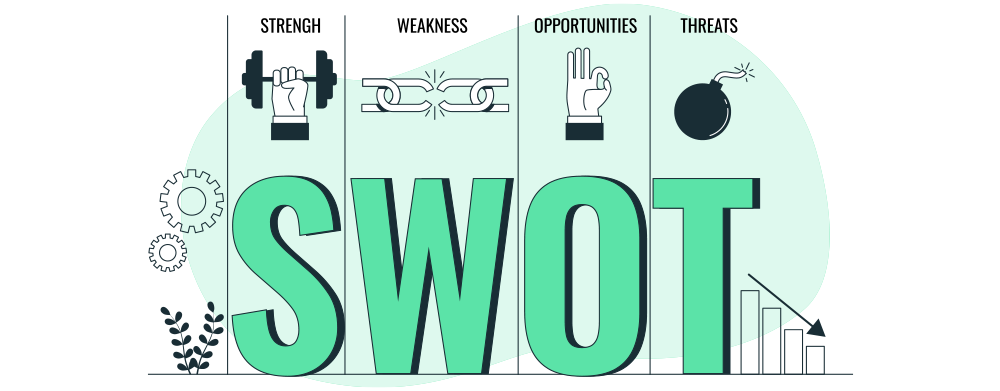Expert Interviews
- University Reviews
- Career Guide
 Video Counseling
Video CounselingImportant Facts
- Ask any Question - CV Forum

Top 15 Commerce Project Ideas & Topics for Freshers [Latest Ideas for 2026]
College Vidya Team Jan 22, 2026 27.7K Reads

Choosing the right project in your subject area as a fresher can be a tough decision to make as you have a myriad of options available to you from which you must make the right choice for yourself. While the project topic you select affects your curricular evaluation for the course, projects can also be quite helpful in setting your portfolio apart from the rest of the crowd. Hence, selecting a meaningful, interesting, and relevant project topic in commerce is important.
But if you are a fresher confused about selecting an appropriate topic for your commerce project and are running out of ideas, then this blog can save the day for you, as we have brought 15 of the trending and currently relevant topics to pursue a project for freshers in 2026! Continue reading to explore more about interesting and innovative commerce projects and topics.
|
|
|
|
|
|
|
|
|
|
|
|
|
|
|
|
|
|
|
|
|
How to Choose a Project Topic in Commerce: Top 7 Factors to Take Into Account
Choosing the right project topic and arena is essential, not only because it helps you complete an interesting study with important findings for your curriculum, but also because its insights can shed light upon underexplored domains, and have implications for your career and portfolio in the future as well.
Thus, exploring and selecting relevant and meaningful topics for your project right from your first year of higher education is essential. However, the process is easier said than done. Hence, here we have mentioned tips and 7 of the major factors you can consider for making a choice about the research topic for your commerce project.
- Evaluate Your Interests and Focus Areas
The first and foremost factor to consider is whether the project topic you are considering interests you enough to complete it with thorough research and effort. If you end up selecting a topic which does not align with your interests, then completing a full-term project in it or pursuing the project over a prolonged period of time can be especially challenging.
Hence the first step in selecting your commerce project–identify your major interest areas and research further in those areas to explore and find the right topic for yourself!
- Evaluate Alignment with Current Trends & Developments in Commerce
In addition to paying close attention to one’s interests, it is also important to evaluate if the topic is in-sync or integrated with the current developments in the discipline. Going for a topic which is especially relevant with respect to current developments in commerce (for instance, the topic of e-commerce is garnering increasing attention each day) can add to the relevance of your project and its applicability.
- Evaluate the Relevance to Commerce
It is important to understand how your project topic or its findings can contribute to the field of commerce and fill research gaps in the field. The relevance of a project is especially important for your career in the long-run as it can have important implications for the various fields of commerce and make a mark on both the discipline and your career.
- Choose a Unique & Original Topic
While selecting a commerce project topic, one should refrain from merely replicating existing projects or topics in commerce. While drawing inspiration from existing projects or researches, choosing a topic which has some originality in it is also important to fill existing research gaps. Thus, selecting a topic which is original and unique (with respect to filling some research gap in the field) is quite important.
- Consider the Feasibility of the Project
The feasibility of the project is quite important if you want to effectively complete it within a stipulated time, which is normally the case for curriculum-mandated projects that students take up. Thus, evaluating if a project or project design you select is practically feasible is also important to consider.
- Consider the Applications of Topic
While indulging in basic and descriptive research studies and projects are important for the theoretical development of the field and filling research gaps, innovative projects with practical applicability are quite important and can help set your project apart, thus adding a leverage to your career.
- Align the Topic with Your Career Interests
Lastly, but certainly not the least, identifying a project topic that is interesting as well as fulfilling your future career interests can be strategically highly useful for profile building and enhancing available career opportunities for yourself. With thorough projects conducted in areas that align with your career goals, you can build a portfolio that shines through and sets you apart from your competitors.

By considering the above mentioned factors when selecting a commerce project, students can end up with commerce project topics that are well-suited for their current degree, the field of commerce at large and their career needs in the future.
|
|
|
|
|
|
|
|
|
|
|
|
|
|
|
|
|
|
Top Subject Areas to Choose a Project From
The field of commerce is overarching, consisting of a multitude of specific areas to explore further through a project. Within specific conventional subject areas of commerce as well, there are a number of subdomains which are gaining prominence in recent years. Mentioned here are some of the prominent subject areas which you can consider for pursuing a project in commerce:
- Accounting (with subdomains like managerial accounting, corporate accounting, financial accounting, accounting in the BFSI sector, chartered accountancy etc.)
- Marketing (with subdomains like digital marketing, business development, drip marketing, paid marketing etc.)
- Business Development (with subdomains like channels for business development, strategies for business development, success factors for business development etc.)
- Outsourcing (with subdomains like outsourcing of human resources, material supply, services, verticals etc.)
- E-commerce (with subdomains like marketing in e-commerce, retail in e-commerce, auditing, accounting etc.)
- Impact of COVID on Indian Economy (with specific focus on an industrial sector, the private or public sector, success case studies etc.)
- GST (with specific focus on its development and introduction in India, its success, factors contributing to its success, impact of its introduction on the Indian economy etc.)
- Banking and Finance (with subdomains such as BFSI functioning, financial management in banks, accounting, auditing, taxation, investment banking, stock brokerage etc.)

Thus, there are a number of topics and subject areas in commerce that can be used to pursue a project in. These topical domains and subject areas in commerce provide vast avenues within them to explore further and derive interesting insights about.
Top 15 Commerce Project Ideas and Topics for Freshers
Mentioned here are 15 commerce project topics and areas that can be considered for a project by a fresher. These topics are concise, matched to the proficiency levels freshers are expected to have, and can provide a much-needed boost to students in terms of exposure to actual research in commerce.
1. Role of Monetary Incentives for Enhancing Employee Performance

Understanding the role that incentives can play in motivating employees for enhanced performance is of prime importance. Understanding the dynamics of monetary incentives and their influence on the performance levels of employees in an organisation setup is at the heart of this project.
Primary Objectives of Project
- To understand if monetary incentives can enhance employee performance in organisations
- To understand the degree of impact that monetary incentives can have on employee performance
- To explore strategies through which monetary incentives can be introduced in organisations to motivate employees and enhance their performance levels
Potential Areas to Cover through Project
- What are incentives?
- Types of Incentives
- Monetary Incentives & Their Impact on Employee Motivation & Performance
- Comparative Analysis of Monetary Incentivisation as Occurring in the Public and Private Sectors in India
- Strategies to Introduce/Manage Monetary Incentives in Organisations
- Alternative Strategies to Using Only Monetary Incentives in Organisations
Implications of Project
- The project will have important implications for actual field-settings towards introducing or managing monetary incentives.
- Being a holistic project, this project can provide directions for future research for other disciplines like psychology etc. to understand how employee motivation and performance work and are related.
- The study also has important implications for policy framing and incentivisation by managers and organisations, especially with respect to the pros and cons of monetary incentives.
2. Outsourcing of Human Resources in the FMCG Industry
Outsourcing, whether of labour, human resources, or materials has become increasingly common wherein maintaining fully in-house task forces and groups are tough and costly. As a result, many industries, especially the FMCG industry, have become increasingly focused on the outsourcing of human resources for running their operations. However, this is often related to consequences on the workforce’s morales, motivation to work, dynamics related to performance, incentives etc. which ultimately impact the organisation’s productivity and profits. This project aims to understand how the outsourcing practices in the FMCG industry relate to the impact on various aspects of organisational functioning.
Primary Objectives of the Project
- To examine and explore the antecedents and causal factors for outsourcing specifically in the context of FMCG Sector.
- To understand how outsourcing human resources for labour and functioning impacts the employee morale, employee relationships, employee motivation, employee performance etc.
- To understand how outsourcing impacts production for the organisation as a whole.
- To understand the context of the FMCG Sector and if outsourcing is an effective option for the industry.
Potential Areas to Cover through Project
- Outsourcing and Literature Review about its Important Correlates
- FMCG Sector and Its Characteristics
- Financial Operations and Business Development in FMCG Sector
- Outsourcing in the Context of FMCG Sectors
- Impact of Outsourcing in the FMCG Sector
Implications of Project
- The study being specifically tweaked to the FMCG sector and its unique context, it has important implications for the benchmarking of policies and HRM best practices when it comes to in-house production or outsourcing.
- The study’s findings can be useful for evaluation of effective financial management strategies for outsourcing in the FMCG Sector
- Business development strategies and strategic decision making by the leader must be based on careful assessment of the consequences of outsourcing, which can be explored through this study.
3. Efficiency of Cooperatives in Tackling Unemployment

Cooperative societies and thrifts have emerged as a leading channel for individuals to come together to develop small-scale businesses to generate revenue and tackle their financial constraints and tackle rampant unemployment. While the utility of cooperative societies is undeniable, the current project aims to understand and assess the actual success of cooperatives in tackling unemployment in Indian society.
Primary Objectives of Project
- To understand the impact of cooperatives in various parts of the Indian society on unemployment.
- To understand the feasibility of establishing and running cooperatives with respect to the benefit they have on the employment rates and life quality of individuals engaged in it.
Potential Areas to Cover through Project
- What are Cooperatives?
- Utility and Impact of Cooperatives on the Indian society
- Unemployment Rates in India and its Negative Consequences of National GDP and Life Quality of Individuals
- Role of Cooperatives in Tackling Unemployment
- Financial Benefits of Cooperatives to its Members
- Well-Being of Cooperative Members in the Long-Run
Implications of Project
- The implications of this project can be far-reaching both within the finance and commerce industry and at the societal level at large.
- The project has implications for policy formation by government bodies about formation of and supporting more cooperatives to aid in enhanced employment opportunities.
- This project’s findings has implications for training interventions at the community level in terms of sensitising individuals about effective financial investment in cooperatives, importance of upskilling and so on.
4. Impact of Outsourcing on Material Availability and Decision-Making
It is well-known that outsourcing measures have an impact on various aspects of organisational functioning. This project topic is focused on examining how the practices of outsourcing affect decision-making (at a conspicuous or an implicit level) and material availability in the organisational context.
Primary Objectives of Project
- To understand the contexts in which outsourcing is an advantageous option for organisations
- To understand the degree to which outsourcing is related to material availability in an organisation and impacts the decision-making
- To understand the strategic antecedents for decisions about outsourcing.
Potential Areas to Cover through Project
- Outsourcing and Relation with Material Availability
- Financial Challenges faced by Organisations when engaging in Outsourcing
- Operational and Production Challenges due to Outsourcing
- Cross-Industrial Differences affecting the Impact of Outsourcing in Organisations
Implications of Project
- The project can generate important findings with implications for delivery time and production processes.
- Moreover, the study’s findings can have implications for financial management and solutions to the financial challenges faced by organisations when engaging in outsourcing activities.
- Additionally, the study’s findings about the relationship between the material availability and outsourcing can be useful for the supply chain and logistics departments of the organisations.
5. Role of e-Commerce in Emerging Markets in India

E-commerce or commercial practices through the electronic mode, be it audio-based marketing, televised commerce or internet-based commercial ventures, have completely transformed the face of conventional commerce operations. Understandably, the impacts of such a transforming mechanism of commerce has impacts on various aspects of the economy in a country, which is the precise focus of this project.
Primary Objectives of Project
- To understand how the domain of e-commerce emerged in India
- To understand the impacts of e-commerce on various sectors of India
- To specifically examine and understand how e-commerce impacts the emerging markets in the Indian subcontinent.
Potential Areas to Cover through Project
- The Indian Economic Context
- e-Commerce and its Evolution Through the Years
- e-Commerce and its Impacts
- e-Commerce and Its Role in the Indian Economy
- e-Commerce and Its Role with respect to Newly Emerging Markets
Implications of Project
- The study brings to light an important and up and coming domain of commerce, i.e. commerce through the digital mode, which has impacted the economic markets and industries of India.
- The study can also explore specific case studies about organisations or e-commerce domains to compare them or bring forth in-depth insights for the same.
- The study’s findings can have implications for the in-depth exploration of the financial underpinnings and long-term transformation of the Indian conventional market economy in addition to the emerging markets.
6. Post-COVID Impact on National Economy
The coronavirus pandemic, which impacted individuals and states on a global scale, disrupted all aspects of human functioning, including commerce and economic activities. The impact of the same had also been observed on the national economy of India as thousands of livelihoods and regions were impacted. After 3 years since the pandemic, this global scale crisis still warrants an in-depth exploration of the impact it created on the Indian economy. This project idea delves into the same.
Primary Objectives of Project
- To understand the impact of COVID-19 pandemic on the financial sector and industries in the BFSI domain
- To understand how the COVID-19 pandemic impacted the national economy in terms of services, marketing, GDP, avenues of sales explored by industries and so on.
Potential Areas to Cover through Project
- COVID-19 and Indian Context
- Strategies taken up in India for Tackling the Economic Setback experienced during the COVID-19 Impact
- Impact of the COVID-19 pandemic on the Indian Economy
Implications of Project
- This current project and its findings can have important implications for identification of the lacunae in the strategies taken up in India to tackle the economic challenges during the pandemic, based upon which strategies to enhance the country’s future preparedness for similar unforeseen crises can be developed.
- Moreover the study has important implications for strategic decision-making of industrial units and organisations about crisis management with respect to financial management, investments, business development and so on.
- The study’s findings can provide insights about the effectiveness of decisions by top authorities and management regarding supply chain during such disruptive situations such as the COVID-19 pandemic.
7. Role of Data Analytics in Business Decision-Making
The utility of data analytics in guiding scientifically-rooted decisions, especially in a business context has come to the forefront in the current decade. Rising attention is being provided to how data analytics can be used effectively in business to drive growth and success. A commerce project in this domain exploring various aspects such as the strategies and tools for effective use of data analytics in business decision-making can provide novel and interesting findings.
Primary Objectives of Project
- To understand the antecedents and factors impacting business decision-making
- To understand how data analytics as a field can facilitate business decision-making
Potential Areas to Cover through Project
- The Emerging field of Data Analytics
- Data Analytics and its Applications
- Current Business Decision-Making Strategies in Organisations
- Role of Data Analytics in Business Decision-Making
Implications of Project
- The study has important implications in empirically understanding how effective data analytics are for making business decisions.
- The study’s findings can provide insights about the comparative effectiveness of tools for data analytics in business decision-making.
- Moreover, the study’s findings can shed light upon the effectiveness of the use of data analytics across various industries as well as ways in which its use can be deployed effectively in industries.
8. SWOT Analysis on a Multinational Conglomerate

SWOT analysis is one of the common techniques utilised in various settings, whether at an individual level, the group level or at the organisational level to holistically assess the positionality of an entity with respect to its strengths, weaknesses, opportunities and threats. Such a study takes both the intrinsic and the extrinsic (environmental) factors into account. The SWOT analysis of a multinational conglomerate takes into account the various aspects of the functioning of the overall organisation allowing for an in-depth analysis allowing novel insights.
Primary Objectives of Project
- To understand the strengths, weaknesses, opportunities and threats of a major multinational conglomerate
- To identify and evaluate the situational factors impacting the SWOT of the MNC.
Potential Areas to Cover through Project
- The various commercial aspects of a conglomerate’s functioning: Financial Operations, Accounting, Incentivisation and Remuneration, Revenue Generation, Market Positionality, Material Availability etc.
- What is a SWOT Analysis and its Importance?
- Importance of SWOT Analysis for a Multinational Conglomerate
Implications of Project
- The study’s findings can be quite useful for the company to gain insights about their strengths, weaknesses, opportunities and threats which might be beyond their cognizance currently.
- The study can acquaint the student in-depth with the case study method and use of a SWOT analysis in actual field cases, thus enhancing their capacity for practical application of the commerce principles.
- The study, if performed thoroughly, can be an important and stellar addition to the portfolio of projects completed by the student.
9. e-Commerce and its Role in Reducing Operational Costs through a Case Study
The impact of e-commerce on the functioning of business ventures and organisations has been quite strong, with a transformative influence on various aspects of functioning. This project is tailored to grasp the underlying aspects and consequences of e-commerce and the provision of commercial services through the internet on the operations, specifically the operational costs of the company.
Primary Objectives of Project
- To understand how e-Commerce is being leveraged by organisations in India in contemporary times.
- To evaluate the impact of e-commerce on operational aspects of an organisation, especially with respect to operational costs.
Potential Areas to Cover through Project
- The Indian Economic Context
- e-Commerce and its Evolution Through the Years
- e-Commerce and its Impacts
- Impact of e-commerce on the various functional aspects of an organisation
- Impact of e-commerce with a focus on reducing operational costs in an organisation
Implications of Project
- The study’s findings will be useful for Indian organisations across industries with regards to how e-commerce technologies and strategies can be leveraged to enhance business and profits.
- The study’s results can provide insights about current industry practices for operational cost-cutting and can be used to understand the effectiveness of current strategies.
- The study can have important implications for the long-term supply chain and operations practices of an organisation, especially with respect to promoting best practices using the new trend of e-commerce.
10. Understanding Cooperative Thrift and Credit Society
Cooperative thrift and credit societies can commonly be seen in organisations or other social groups, but their ground effectiveness in operations and functioning is yet to be explored in its full potential. The current study is focused on understanding the effectiveness of credit societies and cooperative thrift with respect to their advantages, disadvantages, success rates, possible case studies etc.
Primary Objectives of Project
- To understand and explore the cooperative thrifts and credit societies
- To understand the functioning of cooperative thrifts and credit societies
Potential Areas to Cover through Project
- Cooperative Thrift & Credit Societies
- Functioning of Cooperative Thrift and Credit Societies
- Effectivity of Cooperative Thrifts and Credit Societies in Meeting Established Goals
- Advantages and Disadvantages of these Societies for the Community at Large
- Types of Cooperatives in India
Implications of Project
- The implications of this project include those like the identification of potentially effective types of cooperative thrifts in India and their functioning.
- The study can shed light on the strategies and best practices that add to the effectiveness of specific cooperatives and thrifts.
- The implications of the study also include the identification of lacunae and loopholes in cooperative thrifts and credit societies which may lead to financial losses or scamming of members getting involved with them. Further interventions and safeguarding practices can also be developed along similar lines.
11. Detailed Case Study of a National Bank and its Operational Effectiveness
Studies in the banking sector can be of great interest to students aiming for a future career as a banker or in the BFSI sector. As a result, a detailed project examining and understanding the various aspects of functioning in a national bank can provide important knowledge related to the field level operations of a bank. The project can be a valuable addition to the portfolio of the student while also providing exposure to the nuances of operations in the banking sector.
Primary Objectives of Project
- To understand the functioning of a national bank in the public sector
- To explore and identify the various factors contributing to the operational effectiveness of the national bank.
Potential Areas to Cover through Project
- Banking Sector and its Dynamics
- Banking in the Private and Public Sectors
- Operational Effectiveness in the Banking Sector
- Factors Contributing to the Operational Effectiveness in the Banking Sector
- Detailed Case Study of a National Bank in India with respect to the its Operational Effectiveness
Implications of Project
- The current study could have important implications on the overall functioning of national banks in the Indian job sector.
- The insights developed from the study can also be used to identify potentially beneficial practices and strategies that can successfully contribute to the overall operational effectiveness of a national bank.
12. Evolution of Consumer Laws in India Over the Years

Consumer laws are an important section of the Indian Constitution elaborating upon the rights and responsibilities of consumers while also focusing on the guidelines for services and products offered to consumers by companies. The consumer laws in India have evolved over decades in India since their inception, keeping up with developments on the economical front and global level. A commerce project focusing on the development of consumer laws in India and their evolution over decades can be an interesting project to pursue. However, to set one’s project apart from similar endeavours by others, the student can place the developments, amendments and evolution in the larger socio-political and historical context to provide a holistic perspective on the consumer laws in India.
Primary Objectives of Project
- To trace the evolution of the various consumer laws in the Indian economy
- To identify the major milestones in the consumer laws policies in India
- To identify the impact of the various consumer laws in providing consumer support
Potential Areas to Cover through Project
- Consumer Laws in India
- Major Milestones in the Evolution of Consumer Laws through the Years
- The Importance of Consumer Laws for the National Economy
- The Impact of Various Consumer Laws and their Amendments on the Consumer Industry
Implications of Project
- The study can generate important findings about the effectiveness of the various consumer laws and their amendments in the industrial and consumer market and economy of India.
- Being a descriptive project, it can trace and effectively chart how consumer laws have evolved in India, which can provide further impetus for the identification or development of future amendments in consumer law.
- Furthermore, the identification of the impacts of various consumer laws can be used by industrial units to introduce best practices that not only comply with the industrial standards and guidelines but incorporate consumer satisfaction in a sustainable manner for their business.
13. Comparative Analysis of Financial Operations in Private and Public Sector Banks
The differences between the private sector organisations and public sector organisations become apparent at multiple levels and domains. A commerce student can indulge in exploring such differences between private sector and public sector banks with respect to their financial operations through this project.
Primary Objectives of Project
- To understand the financial operations in the banking sector
- To explore the financial operations and its dynamics in the private and public banking sector in India.
- To compare the practices in the private and public banks in India with respect to their financial operations.
Potential Areas to Cover through Project
- Dynamics and Operations in the Banking Sector
- Financial Operations in the Banking Sector in India
- Differences in Financial Practices in the Private and Public Banks in India
- Effectiveness of the various Financial Practices in the Public and Private Banking Sectors
Implications of Project
- The study’s findings can provide a sound basis for the identification of strategies for effective financial management by banks, both private and public, thus paving the path for development of check and balance systems for internal quality assurance for the sectors.
- The study also has implications for the identification of ineffective strategies of financial operations, their consequences and further elimination in the informational and material supply chain.
- The comparative analyses of the financial operations of the private and public sector banks paves the way for the better alignment of processes in both by successfully identifying the faulty or inefficient practices in both.
14. Business Development Strategies in Healthcare Institutions
Healthcare institutions present a unique case of organisations which engage in business development considering the high stakes and graveness of their services. As a result, marketing and business development strategies in the healthcare sectors can be challenging to develop. A detailed project exploring how effective strategies can be created in the business development domain for hospitals and healthcare institutions can thus be a highly application-oriented innovative project.
Primary Objectives of the Project
- To understand the strategies used by healthcare institutions to enhance their business development
- To understand the differences in the approach by private and public healthcare centres towards business development
- To examine the impact and effectiveness of various business development strategies used by healthcare institutions
Potential Areas to Cover Through Project
- What is Business Development?
- Business Development Strategies currently in Use
- Unique Context of Healthcare Institutions for Business Development
- Business Development Strategies Deployed Currently in Healthcare Institutions
- Case Studies of a few Healthcare Institutions for Business Development
Implications of Project
- The findings of this study can provide insights about an essential but often overlooked aspect about the industry of healthcare services–the need and strategies for business development.
- Furthermore, the findings of the study can also be a potential source of rich data for comparison of the needs and strategies used by healthcare institutions in the private and public sectors.
- The exploration about the effectiveness of the current strategies being used has implications for development of business development strategies that can be developed in the future by leveraging technological advancements and the shift to digital marketing.
15. Financial Due Diligence during Mergers and Acquisitions

Mergers and acquisitions are a challenging transition that organisations go through, involving revolutionary changes in the functioning and operations. An important reason for many M&As is the heightened chances of financial growth and gains. However, without a sufficient compatibility analysis of the two merging organisations, mergers and acquisitions suffer the probability of the venture failing. Thus, a detailed financial due diligence aimed at understanding the financial operations, their compatibility and potential for success of the merged venture is essential during an M&A. Through this project, a commerce student can effectively explore the nuances of mergers and acquisitions and gain skills and knowledge about the conduction of a financial due diligence during an M&A.
Primary Objectives of Project
- To understand the unique financial contexts and needs of two organisations during a merger or acquisition between two companies.
- To understand and explore the important role that thorough financial due diligence plays before and during the process of a merger or acquisition.
Potential Areas to Cover through Project
- What are Mergers and Acquisitions?
- Types of Mergers and Acquisitions
- Effective Strategies for Successful M&As
- Financial Due Diligence and its Importance during an M&A
Implications of Project
- The study’s findings about the importance of a thorough financial due diligence can help companies and organisations identify the possible loopholes they may encounter without sufficient financial due diligence.
- Furthermore, the study can also shed light upon the inefficient practices during a financial due diligence that may occur and hamper the findings of the due diligence.
Top Trending Articles
|
|
|
|
|
|
|
|
|
|
|
|
|
|
|
Conclusion
Understanding how well your interests and career goals align with the project topic you select and contribute effectively to the field of commerce as a discipline is important in selecting the right project. There are a number of innovative and underexplored topics and domains in commerce that you can explore and consequently pursue through a project. This blog brought forth to you a multitude of topics and ideas for a commerce project, especially if you are a fresher in a commerce course.
FAQs (Frequently Asked Questions)
Some of the good commerce projects to go for include the analysis of financial operations in national banks, importance of due diligence during M&As, outsourcing of HR in a particular industry, cooperative thrifts and societies, e-commerce in Indian context and so on.
Some of the trending commerce project topics include those like e-commerce and its impact, digital marketing, consumer laws and consumer behaviour, enhancement of employee performance due to monetary incentives etc.
A few of the best arenas to venture into for a fresher doing a commerce project include descriptive studies such as comparison of financial/commercial aspects of organisations, case studies of specific companies, exploratory studies related to cooperatives, e-commerce, digital marketing etc.
There are a number of research topics in the field of commerce. While the selection of a research topic should depend on a number of factors such as your area of interest, the existence of a research gap or the relevance and feasibility of researching on the topic, a few of the prominent areas include those like e-commerce, use of digital marketing for business development, GST, cooperative thrifts, data analytics in commerce, accounting and banking in the new age and so on.
Some of the good methodologies to use in a commerce project include those like case studies, quantitative enquiry, qualitative enquiry, surveys, agile methodology, kanban techniques etc.
Selecting the right commerce project, especially for the curricular fulfilment of a degree or other course can be a challenging and tough decision. However, considering your interests, the relevance and implications of the project for the field of commerce at large, the topic’s alignment with your career goals, feasibility of completion of the project and lastly, the originality of the topic can help you in ending up with selecting the course which is right for you.

Idea Alchemist / Concept Creator / Insight Generator
We are an online education platform where users can compare 100+ online universities on 30+ X-factors in just 2 minutes. With an active CV community, we have transformed online learning to quite an extent. With the CV Subsidy scheme, we contributing to GER in India while helping our learners with their finances in their “Chuno Apna Sahi” journey!
Every query is essential.
Our team of experts, or experienced individuals, will answer it within 24 hours.
Recommended for you
Tired of dealing with call centers!
Get a professional advisor for Career!
LIFETIME FREE
Rs.1499(Exclusive offer for today)

Pooja
MBA 7 yrs exp

Sarthak
M.Com 4 yrs exp

Kapil Gupta
MCA 5 yrs exp
or



Career Finder
(Career Suitability Test)
Explore and Find out your Most Suitable Career Path. Get Started with our Career Finder Tool Now!
ROI Calculator
Find out the expected salary, costs, and ROI of your chosen online university with our free calculator.

